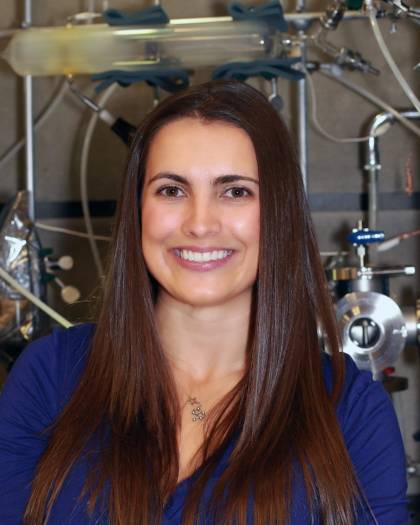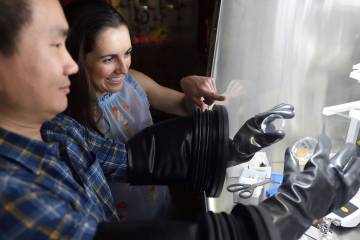Sarah Hörst, assistant professor in the Department of Earth and Planetary Sciences, is a recipient of the prestigious 2020 James B. Macelwane Medal from the American Geophysical Union. Widely considered the highest honor for early career scientists in the field of geological and planetary sciences, the medal recognizes three to five researchers worldwide annually for their depth and breadth of research, impact, creativity, service, outreach, and diversity.

Image caption: Sarah Hörst
Hörst, who arrived at Johns Hopkins in 2014, uses groundbreaking photochemical modeling and laboratory atmosphere simulation experiments to study the formation and composition of planetary atmospheric hazes, with a particular interest in the complex organic chemistry occurring in the atmosphere of Titan, Saturn's largest moon. She is also interested in complex organics elsewhere in the solar system and beyond, whether they are produced in an atmosphere or on a surface.
"Over the past six years, everything that I have accomplished has happened with and because of my amazing research group," Hörst says. "It has been a challenging six years for many of us, personally and professionally, and we have gotten through it with laughter, kindness, and grace. There is nothing in the world that I am more proud of than my amazing research group. I couldn't have done it without them, and I wouldn't have wanted to."
Hazes are significant in determining habitability because under the right conditions, adding energy to simple mixtures of common gasses like water, methane, ammonia, and hydrogen can produce much more complex molecules like amino acids, which form the building blocks of living organisms.
Hörst's lab has demonstrated surprising haze chemistry on Titan and is the first in the world dedicated to studying photochemical haze production in exoplanet environments. Her experiments show that a rich diversity of aerosol particles can be produced in gas giant atmospheric mixtures at gas abundances and temperatures that are realistic for exoplanets. Her work has implications for determining biosignatures and habitability from observations of exoplanet atmospheres, and was important in motivating and designing NASA's planned Dragonfly mission to Titan.
"Sarah Hörst has made outstanding contributions to laboratory research of photochemical haze formation in the atmospheres of Solar System and extrasolar planets. She has published ground-breaking work on a variety of worlds including exoplanets, Titan, and early Earth. She has particularly impressed us by her ingenuity and creativity in developing and leading a new scientific field essentially from scratch: extrasolar planet atmosphere laboratory studies. Indeed, as an early career scientist, her work has already had major impact on the global effort to observe and characterize exoplanet atmospheres," wrote Hörst's colleagues Sabine Stanley, a Bloomberg Distinguished Professor of planetary physics, and Mark Marley of the NASA Ames Research Center.
In addition to her investigations, Hörst has mentored a diverse research group of undergraduates, graduate students, and postdoctoral fellows. She also leads teacher training workshops, gives public lectures, does science communication through social media, and runs Bystander Intervention Training workshops to interrupt gender-based violence. In 2019, she received the Early Career Award from the Laboratory Astrophysics Division of the American Astronomical Society.
Posted in University News








